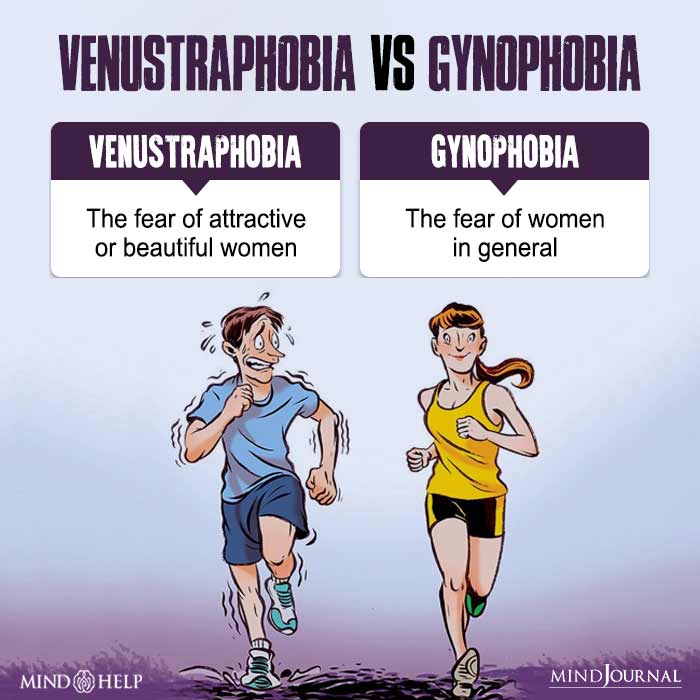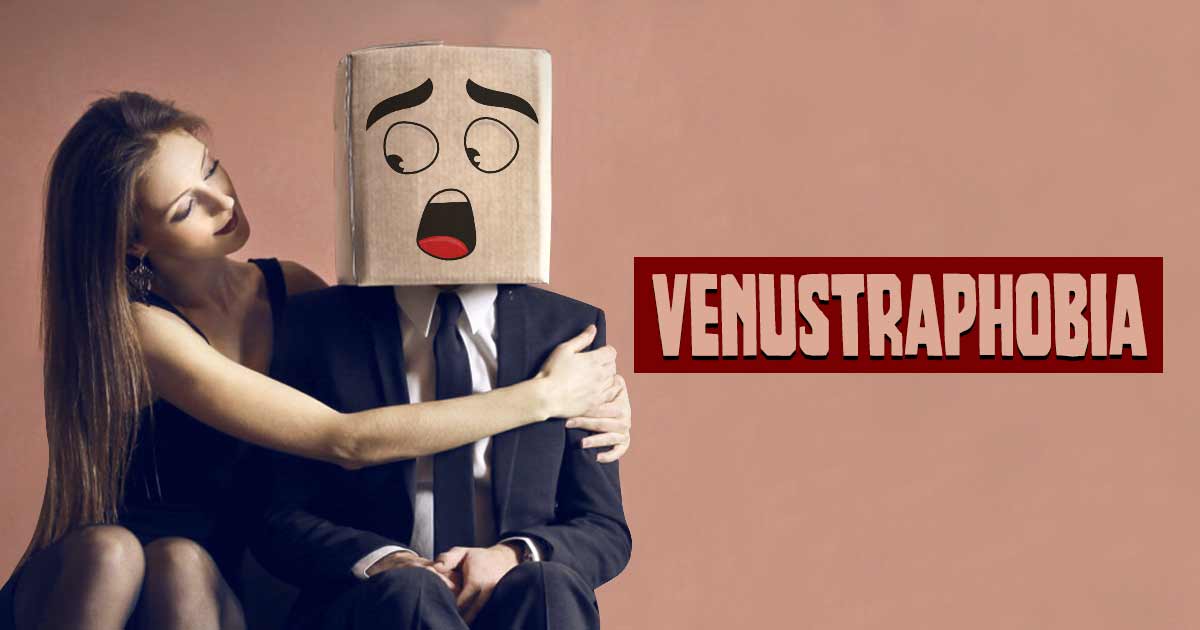Table of Contents
While most men feel attracted to pretty women and/or appreciate the beauty of women, there are some who have an irrational fear of attractive women and may experience extreme anxiety and panic attacks as a result. Let’s take a look at Venustraphobia, the fear of beautiful women.
What Is Venustraphobia?
Venustraphobia, also known as Caligynephobia, is an excessive, persistent and irrational fear of beautiful women. The term venustraphobia comes from the word Venus, the Roman goddess of love and fertility; and the Greek term phobos meaning fear.
Similarly, the word Caligynephobia is derived from the Greek terms ‘calos’ meaning beautiful, ‘gyne’ which means woman, and phobos meaning fear. This condition is mostly observed in heterosexual men but can affect both children and adults.
While a lot of men may feel nervous on a date with an attractive woman, venustraphobia is quite a rare condition and involves a debilitating fear that often makes it difficult for a person to function in everyday life and causes them significant distress.
People with this condition may experience panic attacks at the mere thought or sight of beautiful women. However, they might not have any sexual or emotional interest in the woman that they are afraid of.
Case Example
When he was in primary school, Ahan repeatedly suffered abuse from one of his female teachers. Unfortunately, the incidents were quietly brushed under the carpet and none of the other teachers, most of whom were women, offered him any help.
To protect the reputation of the school, Ahan was forced to keep what had happened a secret, failing which he was threatened with beatings. This left him in a state of constant terror.
As Ahan started growing older, watching movies and shows featuring attractive women would make him quite uncomfortable. One of the actresses he saw on TV seemed to look very similar to the teacher who had abused him. This greatly disturbed him and triggered an episode of extreme nausea, dizziness, and breathlessness.
In fact, every time he saw a woman with features or a voice resembling his childhood teachers, he would have a panic attack. Thus, Ahan preferred interacting only with boys and avoided watching anything that had too many women in it. If there was ever a scene in a film between a man and a woman, he would invariably skip forward or stop watching.
As he entered adolescence, Ahan’s sudden attraction toward girls started making things even more difficult for him. Every time he felt attracted to a girl, he would get flashbacks of the time he was abused, which would result in palpitations, sensations of being choked, and at times, even unconsciousness.
Soon, it was impossible for Ahan to be around women and girls that he found attractive, which greatly affected his ability to make friends and be part of social occasions.
Case Analysis
Ahan’s debilitating fear and anxiety related to attractive women starting from childhood seemed to make it quite difficult for him to function in everyday life. His symptoms are typically indicative of venustraphobia, also known as caligyenephobia, or the fear of beautiful or attractive women.
Symptoms Of Venustraphobia
Intense anxiety is one of the most common symptoms of all specific phobias. However, a person with venustraphobia may also experience self-hatred, depression, and selfish behavior. Some of the common venustraphobia symptoms are mentioned below.
1. Physical symptoms
An actual or imagined encounter with a beautiful woman can lead to the following physical symptoms in a person with venustraphobia:
- Increased heartbeat
- Shaking & trembling
- Perspiration
- Shortness of breath
- Palpitations
- Dizziness and nausea
- Choking
2. Psychological symptoms
People with venustraphobia may experience the following cognitive and emotional symptoms.
- Intense and unreasonable fear of seemingly attractive women
- An urge to avoid or escape situations where there may be attractive women
- Fear of embarrassment
- Thoughts of death and fear of dying
- Loss of touch with reality
- An out-of-body feeling

What Causes Venustraphobia?
Venustraphobia causes have not yet been identified. However, genetics 1 Garcia R. (2017). Neurobiology of fear and specific phobias. Learning & memory (Cold Spring Harbor, N.Y.), 24(9), 462–471. https://doi.org/10.1101/lm.044115.116 , environment, and childhood experiences may significantly influence the development of this condition.
Heredity
If an individual has parents or grandparents with mental health conditions, like phobias or anxiety disorders, they may be more likely to develop venustraphobia 2 Garcia R. (2017). Neurobiology of fear and specific phobias. Learning & memory (Cold Spring Harbor, N.Y.), 24(9), 462–471. https://doi.org/10.1101/lm.044115.116 . Certain environmental factors or traumatizing experiences can trigger phobia in someone who is genetically predisposed to it.
Traumatic Experiences
Disturbing childhood experiences, such as abuse or humiliation from conventionally attractive women may contribute to the development of this phobia. Experiences such as divorce, breakups, or unrequited love can also lead to this fear of beautiful women.
Societal Conditioning
The manner in which women are portrayed in culture and media representations may also influence the perception of good-looking women. If a man has been conditioned from a young age to fear good-looking women by his parents or any other caregiver, he might develop venustraphobia.
Other Factors
Apart from these, people with certain mental health conditions, especially anxiety disorders like GAD and OCD, are more likely to suffer from venustraphobia. Poor self-image and very low self-esteem can also be significant contributing factors in the development of this condition.
Diagnosis Of Venustraphobia
Venustraphobia is currently not clinically diagnosed as a disorder. However, it could be classified as a specific phobia as per the Diagnostic and Statistical Manual of Mental Disorders (DSM 3 NIMH» Specific Phobia. (2020). Www.nimh.nih.gov. Available from: https://www.nimh.nih.gov/health/statistics/specific-phobia ) 5.
In order to be diagnosed, a person must have suffered from an intense and debilitating fear of women they consider pretty/ attractive for a period of six months or more, such that it significantly affects their daily functioning. Moreover, the fear must not be due to any other underlying conditions.
Venustraphobia Treatment
Although there are no specific treatments for venustraphobia, most phobias can be treated by a combination of therapy, medications, and self-help tools. Here are some treatments options that can help you get rid of venustraphobia.
1. Psychotherapy
There are a number of different psychotherapy techniques available to treat this disorder.
A. Cognitive Behavioral Therapy (CBT)
CBT can effectively address and modify negative thoughts and dysfunctional beliefs related to beautiful women. Moreover, it also consists of strategies to overcome the anxiety and panic that come with this phobia. A 2015 study 4 Kaczkurkin, A. N., & Foa, E. B. (2015). Cognitive-behavioral therapy for anxiety disorders: an update on the empirical evidence. Dialogues in clinical neuroscience, 17(3), 337–346. https://doi.org/10.31887/DCNS.2015.17.3/akaczkurkin has found that CBT appears to be efficacious in the treatment of anxiety disorders and phobias.
Read More About CBT Here
B. Exposure Therapy
Exposure therapy 5 Marks I. (1979). Exposure therapy for phobias and obsessive-compulsive disorders. Hospital practice, 14(2), 101–108. https://doi.org/10.1080/21548331.1979.11707486 is perhaps the most common and effective treatment option available for any type of phobia. The process of treating venustraphobia involves gradually exposing the phobic person to beautiful women in a controlled setting, starting with images, stories, or videos.
As a person slowly becomes desensitized to the object of their fear, the therapist might guide them to interact with attractive women in a face-to-face setting.
C. Dialectical Behavior Therapy (DBT)
DBT 6 Chapman A. L. (2006). Dialectical behavior therapy: current indications and unique elements. Psychiatry (Edgmont (Pa. : Township, 3(9), 62–68. [/mfn] can be highly helpful and beneficial for people struggling with emotion regulation. A technique called “half smiling” involves voluntarily smiling as soon as one starts feeling anxious due to their phobia. It may help prevent negative thoughts and emotions from arising and thus regulate phobic reactions to beautiful women.
D. Hypnotherapy
Hypnosis is an alternative form of therapy commonly used for treating phobias. Hypnotherapy can not only help to reveal the traumatic experiences that led to the development of venustraphobia, but can also enable the patients to recover from them.
Read More About Hypnosis Here
2. Medications
Medications, along with therapy, can help someone suffering from this phobia to overcome their fear of beautiful women. Some of the most common medicines prescribed by psychiatrists and therapists include:
- Anti-anxiety medicines, help to reduce feelings of intense anxiety and panic attacks.
- Antidepressants 7 Farach, F. J., Pruitt, L. D., Jun, J. J., Jerud, A. B., Zoellner, L. A., & Roy-Byrne, P. P. (2012). Pharmacological treatment of anxiety disorders: current treatments and future directions. Journal of anxiety disorders, 26(8), 833–843. https://doi.org/10.1016/j.janxdis.2012.07.009 , especially selective serotonin reuptake inhibitors (SSRIs)
However, you must always consult a mental health professional or a primary care physician before taking any kind of medication.
Takeaway
While the fear of attractive/beautiful women can hinder your social interactions and ability to function effectively, recovery from venustraphobia is possible. With a combination of therapy and medication, you can overcome your fear to build a normal social life and develop healthy relationships with women that you find attractive and beautiful.
At A Glance
- Venustraphobia, also known as Caligynephobia, is an excessive and irrational fear of beautiful women.
- The fear of seemingly “attractive” women can adversely affect one’s social life and personal relationships.
- Intense anxiety is one of the most common symptoms of all specific phobias.
- Venustraphobia can be treated by a combination of therapy, medications, and self-help tools.
- Recovery from venustraphobia is possible.
Frequently Asked Questions (FAQs)
1. How Common is Venustraphobia?
Venustraphobia is an extremely rare condition and till now, there isn’t sufficient evidence regarding its prevalence. Most of the references to the fear of beautiful women exist in fiction and pop culture.
2. Is there any correlation between Venustraphobia and Social Anxiety
Individuals suffering from venustraphobia may also suffer from some degree of social anxiety 8 National Collaborating Centre for Mental Health UK. (2013). SOCIAL ANXIETY DISORDER. Nih.gov; British Psychological Society. Available from: https://www.ncbi.nlm.nih.gov/books/NBK327674/ , although this relationship has not been researched as much. Their fear of seemingly “attractive” women can adversely affect their social life and personal relationships.















